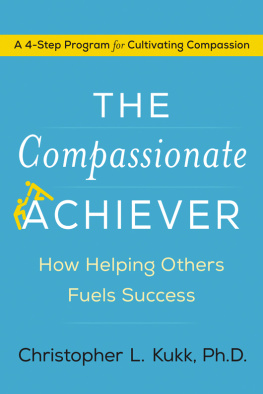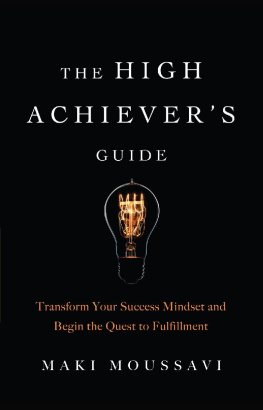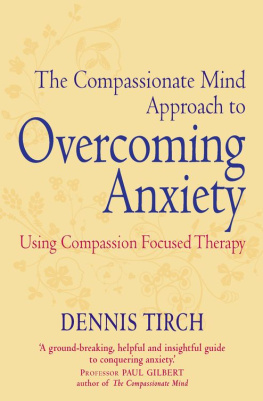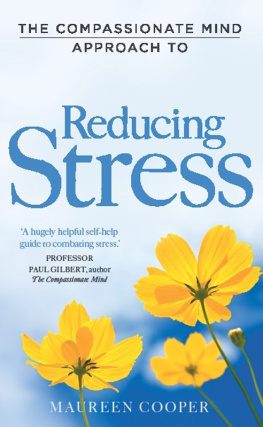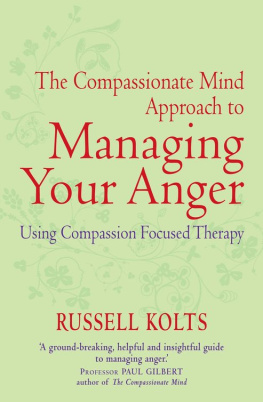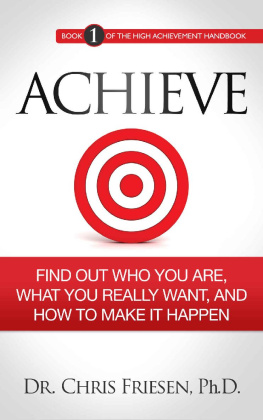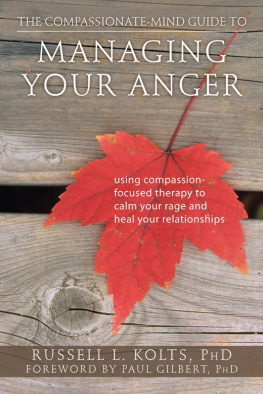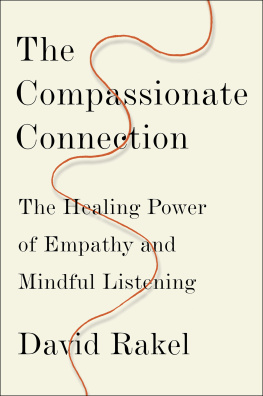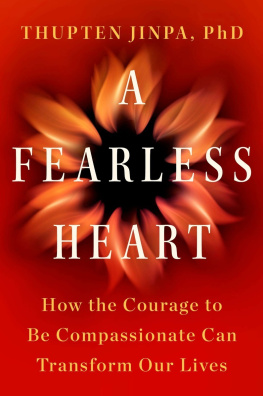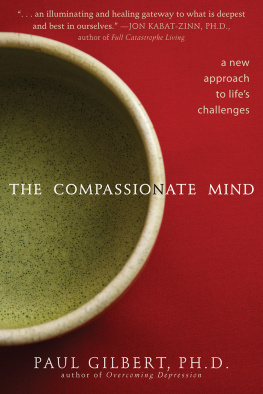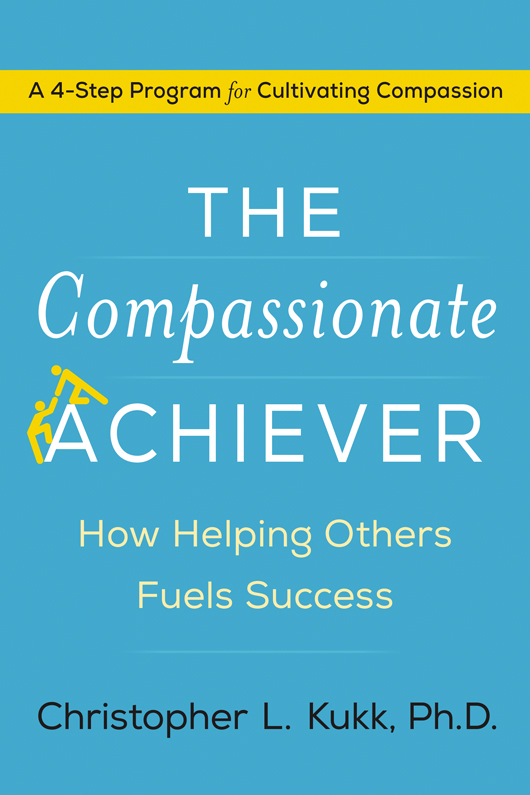Contents
Guide
Australia
HarperCollins Publishers Australia Pty. Ltd.
Level 13, 201 Elizabeth Street
Sydney, NSW 2000, Australia
www.harpercollins.com.au
Canada
HarperCollins Canada
2 Bloor Street East - 20th Floor
Toronto, ON M4W 1A8, Canada
www.harpercollins.ca
New Zealand
HarperCollins Publishers New Zealand
Unit D1, 63 Apollo Drive
Rosedale 0632
Auckland, New Zealand
www.harpercollins.co.nz
United Kingdom
HarperCollins Publishers Ltd.
1 London Bridge Street
London SE1 9GF, UK
www.harpercollins.co.uk
United States
HarperCollins Publishers Inc.
195 Broadway
New York, NY 10007
www.harpercollins.com
Cover design: HarperCollins
Cover illustration: bubaone | iStockphoto

THE COMPASSIONATE ACHIEVER. Copyright 2017 by Kalju Knowledge LLC. All rights reserved under International and Pan-American Copyright Conventions. By payment of the required fees, you have been granted the nonexclusive, nontransferable right to access and read the text of this e-book on-screen. No part of this text may be reproduced, transmitted, downloaded, decompiled, reverse-engineered, or stored in or introduced into any information storage and retrieval system, in any form or by any means, whether electronic or mechanical, now known or hereafter invented, without the express written permission of HarperCollins e-books.
FIRST EDITION
Library of Congress Cataloging-in-Publication Data is available upon request.
ISBN 9780062457899
EPub Edition March 2017 ISBN 9780062457912
To Elly, Cade, Quinn, and Cole...
You are my equation for love: E = QC2
Compassion is the chief law of human existence.
FYODOR DOSTOYEVSKY
My wife, Elly, and I were on an elevated train traveling home after spending the day in Boston, when a loud blast fractured the silence of the car. I didnt need to see the pellets embedded in the window above Ellys head to recognize the source of the sound immediately: a shotgun. I guessed that someone had fired from one of the rooftops parallel to the tracks. As Elly and I dropped to crouch on the floor, the train car slammed to a stop. Now we were trapped like fish in a bowl.
Across from us, we watched in disbelief and horror as a woman holding a baby slowly rose from the floor and stood directly in front of a window. Several people yelled at her to get down, but she didnt move and didnt seem to register anyones instruction. She was clearly in shock.
Then Elly did something I will never forget. She calmly stood up, looked the woman in the eye, and said, Everything is going to be all right. She hugged the mom and her baby and slowly guided them all to the floor of the train car. Almost simultaneously, the train began to move again. Ellys was one of the most brave and compassionate acts that I have ever personally witnessed.
Most of us will never need to risk our lives to show our compassion for another, but whether you practice compassion in a boardroom, a classroom, or your very own living room, you have the power to save and change lives. And you have the power to dramatically improve the quality of your own life.
What is compassion? Compassion is a holistic understanding of a problem or the suffering of another with a commitment to act to solve the problem or alleviate the suffering. Understanding a problem or the suffering of another can happen instantaneously, as it did in Ellys case, or it can develop over time. But the most important thing to know about compassion is that it involves a commitment to act. This is what distinguishes compassion from empathy. Empathy is understanding what another person is experiencing, but for compassion understanding isnt enough. Compassion means actually doing something to help.
Being compassionate is not about trying to be a saint or being so kind that you become a doormat for other people. Being compassionate is not a sign of weakness. In fact, its the exact opposite. It takes strength to remain caring and rational when the easiest thing to do is to stop caring or give in to anger. And it takes bravery to act, when it is much easier to do nothing.
Given the definition of compassion, you might think it is more emotionally and physically taxing than empathy, but thats not the case. Tania Singer, director of neuroscience at the Max Planck Institute for Human Cognitive and Brain Sciences, has found that compassion and empathy are two different phenomena known as DRD4, for instance, has shown that the more compassionate a classroom environment becomes, the greater the level of learning that occurs.
Compassion is commonly accepted as a quality of a good person, but only recently have we begun to make the connection between compassion and success. I started to make the connection when I was a counterintelligence agent for the military. During my service, I noticed that the best agents were the ones who made time to help other agents. Because they assisted fellow agents, they had a large network of colleagues who would in turn help them and have their back even in the most difficult situations. By helping others, these compassionate agents built trust with the members of their team, and that helped them to make better tactical decisions. Over time, compassion has become the focus of my professional and personal life, and scientific research has confirmed what I had anecdotally realized: compassion is the foundation for success.
Success is defined as the accomplishment of an aim or purpose, and being successful means different things to different people. Whether you are trying to get a promotion, reach a financial milestone, complete a degree, or help a child learn to read, compassion will help you to accomplish your goal more efficiently and effectively, and it will make the achievement more enduring, fulfilling, and rewarding. Compassion is win-win. It will help you to be successful, and it will help solve problems and create opportunities for others. The ripple effect takes over from there, spreading success throughout the community. I call people who achieve success by helping others compassionate achievers. It is never lonely at the top if you are a compassionate achiever.
Throughout my professional life, from my military service to my current teaching position, Ive noticed that compassion has been one of the most underappreciated but consistent characteristics of successful people across a wide range of occupations. People usually mention grit, courage, strength, and intelligence when they discuss successbut not compassion. One of the reasons I wrote this book is to help people recognize the link between compassion and success and to demonstrate why compassion should be brought into our discussions of what enables individuals and groups to achieve their goals and overcome difficulties.
Part of my work over the last several years has been focused on building compassion on the local, national, and global levels in an effort to find ways to successfully address problems in areas ranging from education to policing. Ive been trying to weave compassion into the activities and discussions involving every aspect of daily life anywhere I can, primarily through my work as the founding director of the Center for Compassion, Creativity and Innovation (CCCI) at Western Connecticut State University.
Launched with seed money from the Dalai Lama, the CCCI states its purpose as to create awareness within the university as well as the regional and global communities about the importance of compassion, creativity, and innovation in daily and professional life. The CCCI works with local high schools to address homelessness; coordinates with the Charter for Compassion International, an organization founded by bestselling author Karen Armstrong to establish and sustain cultures of compassion locally and globally; and helps colleges around the world become universities of compassion. I have been asked to lead roundtables as well as help employ compassion in organizations ranging from police and social-service departments to schools and hospitals. Ive helped mayors, through the Charter for Compassion International, find ways to become designated cities of compassion, which place compassion at the forefront of the discussion to generate policies and address problems in their locales. We know now that compassion builds successful businesses, governments, schools, and civic communities.
Next page
